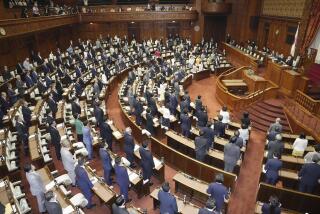Japanese schools to teach patriotism
- Share via
TOKYO — Japanese students can now look forward to studying patriotism as well as math, public spirit in addition to science.
A pillar of postwar Japan’s constitutionally enforced pacifism was knocked aside Friday when parliament passed a law making “love of country” a compulsory part of school curricula.
The education changes were approved on the last day of Prime Minister Shinzo Abe’s first parliamentary session and were accompanied by other laws that will give defense officials more clout in government.
Both changes represent the Abe administration’s determination to erase taboos against expressions of nationalism that conservatives have long said keep Japan from being a “normal” country.
They mark the first step on what Abe has pledged will be a comprehensive overhaul of the nation’s postwar order, including an end to constitutionally enforced pacifism that restricts Japan’s ability to play a more assertive international role.
The new laws are also a conservative volley in a cultural war over Japanese values. The education revisions, in particular, mark a victory for conservatives like Abe over what they view as a school system dominated by left-wing teachers unions, turning out “soft” students who loathe their country and ignore responsibilities to family and community.
The Fundamental Law of Education had not been revised since it was introduced under American guidance during the postwar occupation, and steering the changes through was Abe’s top domestic priority.
The original law sought to prevent schools from inculcating the virulent nationalism of the imperial era.
But Abe and his closest advisors complained that its American-style emphasis on individualism and self-expression was against Japanese values and lay behind what they see as a fraying of the country’s cooperative social order.
They contend that teaching “an attitude that loves the nation and home country” is the tonic to restore a common spirit.
Critics countered that loving one’s country must be a spontaneous emotion and cannot be cultivated by such acts as forcing students to face the flag and sing the national anthem, as several municipal school boards now require.
That position has been weakened by a growing sense that Japanese classrooms are spinning out of control and academic standards are falling.
The national concern has been reinforced by a political and media campaign that suggested discipline and responsibility were being pushed aside by a rampant egotism among Japanese youth.
This week, it was revealed that the government had been rigging its town hall meetings, designed to hear the opinions of ordinary citizens but instead seeded with planted questioners who praised government initiatives such as the education changes.
The education bill’s passage was also oiled by sensational media coverage this fall of what was portrayed as a wave of schoolyard bullying, which contributed to at least a handful of student suicides.
Bullying has been a perennial problem in Japanese schools. But the media obsession with the issue this fall reinforced the sense that schools needed a moral overhaul.
By contrast, there was little friction over the raise in status for the Defense Agency to a full ministry, which does not alter the restrictions on the armed forces to act only in self-defense. The mostly symbolic move has been repeatedly debated in theory, but prohibited in practice by a public aversion to anything that smacked of revived militarism.
That reluctance faded in the face of a bellicose and nuclear-armed North Korea, as well as unease about growing Chinese power, that have contributed to the swing toward a more nationalist mood.
More to Read
Sign up for Essential California
The most important California stories and recommendations in your inbox every morning.
You may occasionally receive promotional content from the Los Angeles Times.












